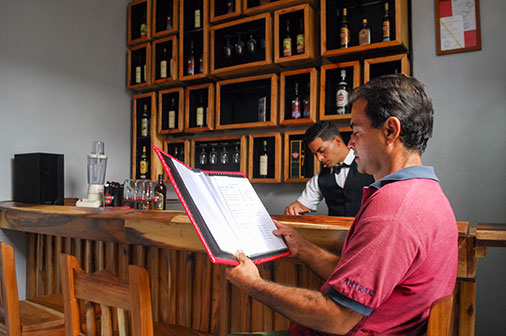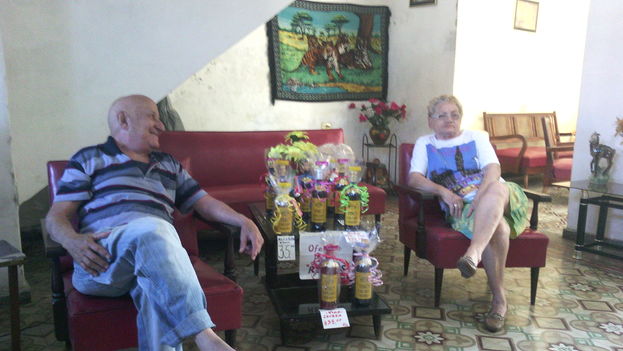
![]() 14ymedio, Ricardo Fernandez, Pinar del Rio, 17 February 2017 – The Pinar del Rio Casa de los Vinos (House of Wines) got off on a bad foot the day of its inauguration. The opening ceremony, held on Tuesday, had to be delayed for several hours as the construction work had not been completed and customers were scarce.
14ymedio, Ricardo Fernandez, Pinar del Rio, 17 February 2017 – The Pinar del Rio Casa de los Vinos (House of Wines) got off on a bad foot the day of its inauguration. The opening ceremony, held on Tuesday, had to be delayed for several hours as the construction work had not been completed and customers were scarce.
Those most missed were the local producers, who were the initial promoters of this initiative – along with the urban agriculture workers – and who planned a place where customers could taste and buy artisanal wines. The idea, which failed for lack of state support, was taken over by the state-owned Internal Trade Company, but without the presence of the private winemakers.
On the island, despite the climate and the limited access to raw materials, an increasing number of producers are making artisanal wines, from the fermentation of fruits such as guava, orange, papaya, pineapple, soursop and mango.
The new place in Pinar del Rio, situated at No. 8 Gerardo Medina Street, seeks to enhance the inventiveness of winemaking and has capacity for 26 customers. “We prioritize the local production of artisan wines,” the manager, Julio Corrales Banos, told the official press.
On the opening day, however, only the industrial wines made in the province were on offer because of the lack of an agreement with the area’s producers. The absence of a legal framework that allows the state to contract directly for the products of these entrepreneurs is limiting local activity.
Artemisa and Mayabeque are currently the only provinces that have greater flexibility in contracts with the private sector. Raúl Castro’s government has given autonomy to the Administration Councils of the provincial Assemblies of People’s Power to experiment with another type of management.
For winemakers from Pinar del Rio, being able to count on something like this would mean a considerable jump in profits due to the increase in demand that has been noticed in the region in recent years.
For the moment, the sale of privately managed wines is carried out from doorways and informal stands on the busiest streets of the city. Some thirty producers sell wine, the majority of which are of excellent quality, despite not meeting the international standards for the inclusion of sugar in the fruit fermentation process.
The wines that are produced in the Island have high degrees of Brix, a unit of measurement of the sugars present in a drink, and are usually sweet or semi-sweet, with a low volume of alcohol.

Ernesto Reinoso, 81 years old, produces 26 Vinos de Rey in a traditional way. “If the objective was to create a space where the people of Pinar del Rio can consume wines, they would have to look at the prices, because the wines we sell are very cheap, 1 Cuban convertible peso (roughly $1 US) a bottle,” he says about the new place.
At the head of the first stage of the Casa de los Vinos was Julio del Llano, a retired winemaker regrets that no private producer was invited to the opening. Del Llano, the third generation of winemakers in his family, is a promoter of quality among producers and was the first in the territory to register his brand.
“We winemakers will have to continue marketing through self-employed workers, as we have done until today,” concludes Del Llano, who has won multiple awards in national quality contests.
In February of last year, in the 25th Artisan Wine Festival, celebrated at the Agricultural Fair of Rancho Boyeros (Havana), a contest was held in eight categories: white, rosé, red, sparkling, dry, semi-dry, sweet and semi-sweet. Luis Bermúdez Rodríguez won the grand prize with a sample of semi-sweet wine made from pineapple and banana, 2013, with 12.8 degrees of Brix.
